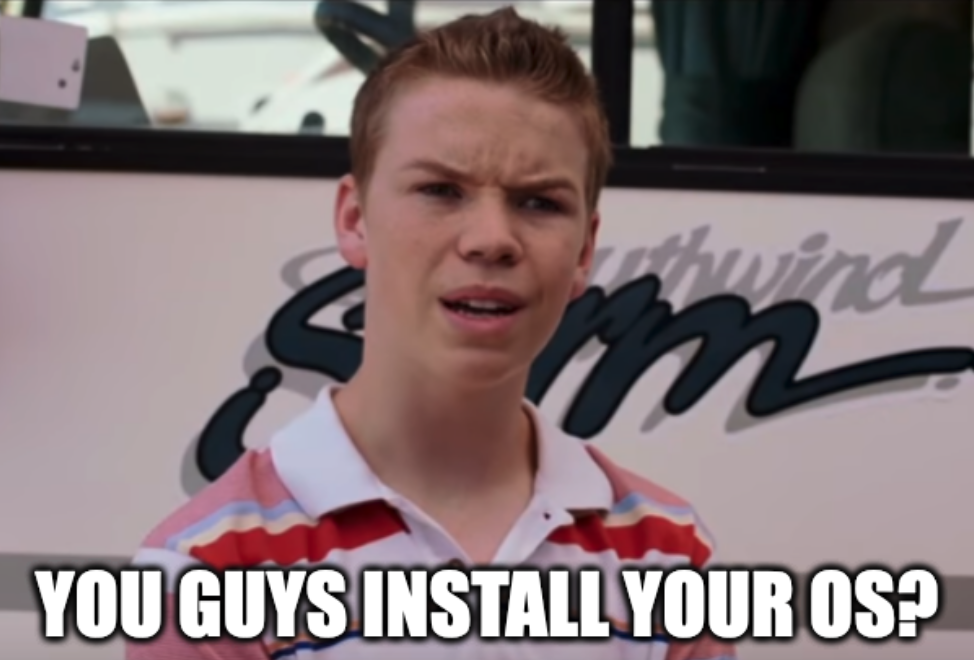I’ve never “debloated” Windows so idk about the top half.
The bottom half is accurate. Debian, Fedora, and Mint are easier to install than Windows 10 or 11. Not that Windows is difficult, it’s just a bit clunky and idiosyncratic.
I assume Microsoft doesn’t care much about the installer since it’s generally only used by OEMs, whereas for Linux distros it’s a first impression so it has to be polished.
No excuse though. Try the “install as oem” of Linux Mint. You get an install with temporary oem account, you can update the system, install additional programs, then click “Prepare for shipping to end user” and on next boot you’re greeted with a setup screen.
That sounds pretty nice. More installers should have something like that
It’s very user friendly. I switched last year and haven’t looked back. I game on it constantly.
Well, if you want accuracy, then no the meme isn’t really that accurate.
On an updated Win11 system the Shift+ F10 command prompt “OOBE\BYPASSNRO” trick still works to setup a new system without Internet (and by extension, without a MS account) so that’s like most of the battle right there
The rest is taken care of with your choice of debloat scripts that are out there
compared to clicking “next” on Fedora, Debian, or Mint
I’d say using a simple straightforward GUI is much easier than an arcane combination of commands and keypresses
Wait, did we just reach a point where a command line input is needed for Windows and Linux just needs to press a few buttons??
I can’t find it now, but there was a meme about that here. How 20 years ago vs present the two are flipped.
Only if you don’t count installing drivers
Well, I didn’t say it should be ranked towards the bottom lol, if we want to make this graph accurate it would be below arch but above “Windows the normal way”
I think i misunderstood you my bad
If you install arch with the archinstall script you basically get a setup wizard
And installing a Microsoft-account-free Windows install is only the first step of de-bloating the system. So I’d say debloated Windows in somewhere between Arch and Gentoo
I used AtlasOS on my windows partition. Had to cause for some reason steam streaming was borked and would only black screen. And now I’m too lazy to swap back over to cachyos. Lmao. Waiting to see that bug is fixed.
I had to install Windows 11 on something a few weeks ago so I decided to do it without an account, it was nowhere near as difficult to do it as this sub would lead you to believe. Pressed a key combination to load up the command prompt then typed in a relatively short command. The GUI restarted and that was it.
Yeh, it’s there.
But Linux installers would straight up ask you. So you don’t even need to hit the CLI
Almost everyone using Linux installed it. Almost no one using Windows installed it.
You don’t think that many people build their own Windows PCs? Linux gaming isn’t that old in the grand scheme of things, and there’s plenty of people who dual boot for various reasons.
I’d almost be willing to bet that there are more people who’ve installed Windows on their PC than there are people who’ve installed Linux from a pure numbers standpoint.
Most gaming PCs are pre built. Boutiques have been a business for decades. And every major PC OEM has a gaming division.pc building is niche.
PC building is niche, yes, but do you think “almost no one” builds PCs, like OP said? And that’s not even including the people who’ve had to install Windows on a pre-built system for one reason or another.
My point is that OP sounds like a smug Linux user shitting on people who use Windows. Even 5% of Windows users is too big a group of people to be described as “almost no one” simply because of how big the userbase is. That would be like saying, “Almost no one installs Linux” because Linux only makes up a small portion of the worldwide PC userbase.
I build my own systems. And I dont know what y’all are smoking but a typical windows installation has the complexity of opening a jar of pickles. Next next yes and away we go.
Linux on the other hand…
Now, if you want to debloat and install without a ms account then yes. But then… Really… Who does that? (i mean of the typical windows users
Avoiding MS account and many manual parts of the installation (opting out of shit) is like two clicks in Rufus before installation. Everyone should do it.
That’s what I’m saying. Windows installation is idiot-proof. And I’m sure there’s enough people who maintain their own systems or at the very least have had to install Windows for one reason or another that to say that “almost no one” who runs Windows installed it themselves is just the “Linux Master Race” talking.
Installing endeavourOS was easier than Windows because of all the ads you need to bypass and the telemetry options on Windows. The partitioning options on endeavourOS were easier too plus if necessary one can use a browser. The only difficulty there was on EndeavourOS which the Windows installer didn’t have was picking a wm.
That was the most complicated installer I’ve seen for a Linux distro beside arch32 which doesn’t even come with archinstall.
Ubuntu, Fedora, OpenSuse, Debian, Mint are also next, next, yes
But those pickle jars also use your monitor’s native resolution
Windows on the other hand…
and all of those numbers combined will still be less than 5% of users.
The latter usually have someone to install it for them.
Almost no one using Windows installed it.
I think Windows installs are really common, at least going off of the size of online gaming communities who generally build their own PCs.
This sub is delusional
Like every linux community. Living in a bubble that doesn’t exist.
Why?
Mac users:

Well Mac users do too… Well they don’t… but someone does.
I was that someone for some family members. I felt icky the whole time.
I once upgraded a girl’s parents’ computer to System 8 and didn’t realize it wasn’t supported. Fucked up the BIOS (or whatever Macs used back then) and they had to ship it back to Apple to get fixed. I did not hear from her again.
But I haven’t actually installed Mac OS since about Puma. New operating systems just come down in the normal software update. But I still cherish my OS X Beta DVD.
A couple months ago my sister bricked her mac somehow… it wouldn’t boot past the stupid white screen with a ? on it.
Had to edit random shit on the built in installer to get it to talk to apple correctly and pull the correct OS image to fix itself. It was a full OS install/recovery.
Easy enough because I understand linux/unix and underneath that’s all it is… but mac users are just stupidly lost… And to get to some of those tools, because they’re so buried underneath the “MAC experience”… it’s a pain in the ass too.
I can’t be bothered to remember what version it was… I hate touching macs. I only did that one cause it was my sister.
Easy enough because I understand linux/unix and underneath that’s all it is… but mac users are just stupidly lost… And to get to some of those tools, because they’re so buried underneath the “MAC experience”… it’s a pain in the ass too.
As a Mac user since System 1.0 with over 20 years of experience using Linux for Fortune 500 companies and major government agencies: Most people are stupidly lost, regardless of the OS they’re using.
Question mark standardly means it can’t find the drive. Used to be hold down the alt key to select boot drive. If nothing comes up still plug into Ethernet in some manner, then boot again with alt, should pull an online os installer that will bring you to the disk utility and such. Can troubleshoot the drive from there and figure out if it needs repairing / formatting / replacing
Where does a Hackintosh fall in?
At the top because you risk going to jail for violating the Apple terms of service/end user license agreement.
You do not risk going to jail, come on lol. People are so dramatic about doing the most minor unenforced crimes I swear
lol. They only ever pursed anyone for selling Mac clones or hardware for doing it. And the hardware was just a preconfigured usb drive with a motherboard connector on it. I think there were actual Apple devs moonlighting as hackintosh contributors.
The hardest one at all. You have to afford a new computer every 2 years.
I don’t think you know what a Hackintosh is.
This is also 99% of Windows users
Windows requires pressing next 12 times, what are you people smoking and can I haz?
There’s also a number of things you have to click “no” on, like a free trial office or Onedrive.
It took me around an hour to set up my new Win 11 laptop, most of which was downloading and installing updates. I expected far worse.
Oh please, we spend an hour fucking around in a new Linux install to get things the way we like them too.
A new Linux installation is usually usable and you spend an hour tailoring it to your specific needs. While in a new Windows installation I spend the first hour remembering things that’ll start popping up/executing in the background and disabling them just to get it to a usable state.
Just learn how to install windows the way you want it to be just like you learn the best way to install a distro. Debloated windows takes minutes to install and takes so little actual effort if you know what you’re doing.
I probably cannot get Windows to be the way I like it. They make every change I want to make a pain, and the ways to circumvent their shenanigans are always changing. Setting up a local account, changing your default browser, stopping onedrive from wasting your time, all of these should be quick and simple changes, but they just wouldn’t let you choose for yourself, they have to shove their products and settings down your throat with every new installation, update, and misclick. I spent more than an hour setting up a new installation and I still find new ways Edge can start itself, I cannot imagine the time it would take for me to make this as usable as a simple Linux installation with some changes to the DE.
All of these changes you list can be achieved in a couple of clicks.
Don’t know what you are smoking my dude.
At some point changing the default browser required setting each file type’s default app one by one. Using a local account once was a normal option then it became hidden and required setting up some questions then you had to disconnect from Wi-Fi and now it’s not a visible option and you have to get around it with some command. This may take you some clicks when you’ve already installed Windows before, but it’s heading towards simply not being an option, and setting up a usable Linux installation is already much easier today.
Man, people are really liberal with the word “usable” around here. As if a plain windows install is somehow this thing that can’t be understood or used. Come on, it makes it hard to take these convos seriously. Millions of people use just plain, out of the box, Windows.
No, see: some of us spend countless hours setting up their NixOS config repo, which is totally worth it because you save half an hour when moving to a new machine
I would argue it takes even longer to get a windows install how I like it. Even using Chris Titus Tech’s tool, it probably takes 2 hours for me to install things like winget, steam, librewolf, libreoffice, blender and configure the task bar and lock screen. Not to mention how last time I checked, I could not rebind the windows key to trigger the app overview how I like it.
How often are you installing windows? I deploy probably 7-8 a week. I can have an image usable without telemetry in 10 minutes.
I seldom install windows, so I also have to relearn some things during the debloat. At 10 minutes, you are basically speedrunning the windows installation process lol.
That’s not windows tho, that’s setting up your entire fucking digital life to your satisfaction. The meme is about like, going to the task bar and telling Microsoft “no this isnt just a shitty gnome, please use my entire monitor”
For everything else just use winget-ui and install everything you want
How I want a windows install is “working, with no BS”.
It comes out the box working, all I needed to do was disable Onedrive on boot. I haven’t even bothered to change the background, and probably won’t.
Getting Mint the way I like it takes about 20 minutes, including the install itself.
Of course, I usually spend four or five hours trying other distros first, before eventually deciding on Mint.
Thaaaaank you for being the fucking voice of reason
And downloading updates is a good thing. Means that the fresh installation isn’t vulnerable to something that was fixed between when the USB / DVD was pressed and the time the person installed it.
Yeah, and you can wander off and do something else in the meantime.
The updates often do take many times the install time which can be a bit frustrating, though it is an area being worked on: https://techcommunity.microsoft.com/blog/windows-itpro-blog/introducing-windows-11-checkpoint-cumulative-updates/4182552
It’s honestly not that bad, it’s not like you’re required to actually do anything while this is happening.
See, Ubuntu only requires pressing next 6 times, and Fedora is only 8.
That’s essentially what it boils down to nowadays.
Unless you want tpm backed full disk encryption in which case… Good luck
One click for Mac and windows, a lifetime of fun for Linux (except arch w/sysdboot which works pretty good)
I’m happy with regular password FDE, i think i’m more likely to encounter hardware failure (and then need to read the drive from another machine) than theft of the drive.
It’s a good point though, I’m sure many people do need this feature. Ubuntu is “working on it” but so far i guess it’s mostly not working except for VMs
I have a media center that serves over the internet via VPN, I don’t want to leave it unencrypted but I also don’t want to have to go home and type in a pass every time California has a power outage, which is monthly during the dry fire season and >monthly during the “storm” season. I wouldn’t care as much for my personal laptop or anything, but for servers it seems like an absolute must have and…what is Linux for if not servers?
I think the traditional way to do that is via dm-crypt, which you can set up with an ssh server.
You can also use a network-shared file rather than a password for LUKS but it’s not as straightforward to set up as a password. If you are doing something like tailscale then it’d be unlocked as long as you are on the VPN
Typing in a password in-person at a data center would be a huge hassle, agreed
But…it’s literally what the tpm chip is for. Like there may be other options, but the tpm chip’s purpose in life is to do this thing. And it’s been doing that for a decade. Seems pretty traditional to me. But Linux folks in some venues treat it like a plague that needs to be eradicated.
Looking at RHEL docs it seems to also work there. The same instructions probably work in Fedora but idk I’ve never done it myself
But then you have to wait 45 minutes for Windows update to spin, and potentially hang in the middle
Is it difficult for you to wait?
No, that’s fair. Annoying but not difficult.
With a MS account. Which spies on everything and sells your info.
Use Rufus, skip online account and automatically opt out of telemetry.
Oobe\bypassnro
Thank me later
Or just use software that you don’t need to mod to do what you want. That’s easier.
Literally not a mod
Do I think needing to do this is fucking stupid? Yes
Do I still put up with Microsoft’s bullshit because Linux is actively worse (as a parallel Linux user)? also fucking yes
I’ve been asking for several years for anything remotely resembling proof of this.
Will you be the first person to actually provide it? (I swear to fucking god if you link me to the terms of use…)
How do you think they advertise to you in the search bar?
They don’t? Very first thing I turn off is that shit show of a function.
However, let’s imagine you’re someone who leaves that on even though it objectively sucks…the answer is cookies. Your spyware example is cookies.
It would be awesome if someone created an OS that didn’t exploit such a resource for financial gain…
What is the very first thing you do after installing the super private and much sekure Linux? You download Steam and give Valve your data. This is bullshit.
So is Microsoft
Yes, that’s my point. You will eventually log into something when using the computer. So while it’s weird that MS made it mandatory to sign into Windows 11, who cares.
They can also get your data without an account if they wanted.
On Linux, you can install Steam inside a sandbox for better security. Easy to do with either Flatpak or Bubblejail. This makes it so that Steam does not have full file system access.
Not something most people are gonna do. If you need privacy and security on the level where even Steam worries you, Windows can be made private too. It’s not even that hard. You just install a different ISO that allows local accounts and do all the necessary tweaks to harden it.
Flatpak is installed on basically every Linux distribution. Literally all I do to install Steam is go to the Software Center and search “steam” and click install. It takes 2 clicks.
You know that Steam is run on Arch right?
would love to see some actual market research on this. sit down a sample of users, have them install then use some OSs. interview them on their experience. rather than yknow making up data
Biased as fuck lol. Installing windows is not difficult. I did it first time at the age of 8 witn WIndows 98 and their newer installers are made so the general public can do it. And the bloat and spyware? Thats windows dude. Its not meant to be your OS, its meant to spy on your ass at the benefit of being familiar and (relative) easy to use. Anything you do to it post clean install is your own tinkering. Linux distros are great yall, but install difficulty is not a metric I would use to attack windows. Comparing between distros makes sense.
It can be quite difficult for puzzling reasons. I bought my laptop with no OS because it was cheaper to buy a Windows license separately. I downloaded the ISO and put it on a USB drive and … It wouldn’t boot. It took me half a day and I had to follow guides with various black magic which I can’t even recall what was about to finally get the thing to boot from USB. After spending over a day on that, I installed Ubuntu and set up dual booting in about 30 minutes.
This doesn’t say it’s difficult, just says there are others which are less difficult. Even if you accept everything at default, windows installs take much longer.
I’m not sure why you even think this is an attack on windows really. You keep saying windows is for those who want easy to use, so why not include the whole process?
Longer != difficult. Windows installs are easy as fuck and id say its as simple as linux mint.
The debloating is a choice and id say thats the same amount of work as installing stuff in linux because what it comes with is very limited.
Im a linux mint user btwIt’s easier than even mint. Because I’ve installed windows dozens of times and it has always worked out of the box. Always.
Friend gave me their old laptop that was sluggish and asked me to reinstall windows. I proposed Linux and promised them it’d work even better, they reluctantly agreed. I install mint. Sound not coming through headphones. I update everything that’s there to update, tried a bunch of shit and waste like an hour before I finally find a thread that suggested manually updating to a newer kernel version. That fixes it.
Now I know something extra for next time but if it were someone less stubborn, they’d have given up and went back to windows. Most people don’t know and don’t care about debloating, trackers and whatnot.
Tldr; Windows is the easiest OS to install because it works right out of the box. Many Linux distros are even easier to install, but don’t always work out of the box.
Exactly. Linux mint was fine on my laptop, but only later i had to upgrade kernel for the amd drivers, but overall its the closest to a spotless experience ive had. But what you said is 1000% correct!
I believe you, but my experience is the opposite. Generally wifi doesnt work ootb on Windows for systems i’ve set up, and newer games are crashy until you install the latest chipset drivers. The drivers Windows installs seem to be many versions back and have been unstable IME
on Ubuntu or Fedora i’ve not had a single issue in over a decade. Not one time has a component not worked for me on the first boot. It’s been truly flawless. Games work at full performance right away.
My only possible explanation is that we must be working with pretty different hardware
Linux has made leaps and bounds with usability and ease of installation but it’s no better than any other modern OS - which is a good thing. Installing Windows from a USB stick is not difficult - the simple path is literally, pick a language, select your wifi, choose who is logging in, click install and go grab a coffee. About the only difficulty if you can call it one is that some installs will ask for a serial number because it’s a commercial product.
Also, the number of questions & buttons during installation is one thing but the certainty of a functioning system is another. Linux is better at supporting old hardware, Windows is better at supporting new hardware. Choose accordingly if that matters.
Linux installs like Ubuntu take about 20 minutes.
The last time I installed windows 11 (thank God only once) it took me a total of 7 hours divided over 3 days. It was hell, requiring multiple iso downloads, multiple tries to burn a USB with a variety of tools, loads of searching and reading documentation, multiple BIOS settings and a BIOS update, multiple install attempts, searching, downloading and installing drivers, then finally on the winning install it still took like an hour with god knows how many “fuck off and do your job” clicks.
Mind you, this was on the same machine where right before I installed Linux on a separate M2 device
Windows installations are a horror show.
As someone who has tried to install Windows from Linux, and Linux from Windows… The meme is accurate. Even getting the official Windows ISO on a USB from Linux or MacOS is a multi-hour journey. Want to only install Windows on part of your hard drive? There goes another 15 minutes. Maybe 30 minutes because it wiped your GRUB partition. Honestly, try to do anything but the default options in the Windows install and you’ll lose 2 hours.
Installing Linux? I’ve installed Arch Linux in under 10 minutes. Manjaro is literally flash ISO to USB using any program (Windows, Linux or Mac) and watch an installer spin for 20 minutes. Windows? You’ll be spending 20 minutes on your first “update”.
I kind of miss the Win98 install process. I did it so many times… Tried making a Win98 virtual machine, but it just wasn’t the same without all the real floppies. The boot disk, the drivers. The JazzJ Jackrabbit shareware. Good times.
Install windows, run debloat powershell script. Done.
Microsoft give no shortage of things to complain about without needing to exaggerate.
What does debloating entail exactly?
Disabling unnecessary background services, disabling telemetry, removing preinstalled adware. Easy to do with WinUtil by Chris Titus Tech.
That’s literally only the first step.
Or just run Tiny11.
The first thing that has actually been useful here. Thanks!
What an absurdly sycophantic graph.
I can agree that installing Arch is easier than installing a debloated Windows. But Gentoo? I spent 2 weeks trying to install it, but couldn’t get past partitioning the drive.
…paritioning the drives is exactly the same for Arch as it is Gentoo lol if you did it for Arch, why can’t you do it for Gentoo?
I meant, I partitioned the drives, but could not complete the steps after that. I couldn’t use that tar file to compile the kernel.
Well, configuring the kernel is where things get tricky and is the major difference between the Gentoo and Arch installation, so that makes sense.
To be annoyingly pendantic, you did get past partitioning the drivea, then!
I think “couldn’t get past partitioning the drive” means they managed to partition the drive but couldn’t get beyond it ie couldn’t do any more after that.
I’m genuinely curious as an Arch user. Does gentoo not come with fdisk?
As a Gentoo user who has used Arch in the past, I have no clue what problems this commenter could have run into because paritioning the drives is exactly the same for both distributions… if they were able to figure it out for Arch, then they can do it for Gentoo
Or you know, gparted, arch bootable, Windows Drive Management, Ubuntu…
I mean out of all the things I’d THINK you’d have trouble in, partitioning and formatting is…. not one of them.
Yes it does. And while time-consuming it’s actually not too bad if you just follow the guide and don’t just skim through it.
There are certain parts of the guide where i really wish it went into more detail.
Last time i installed Gentoo i had the Arch wiki open alongside the guide to help translate
Yeah to be fair it does make some assumptions about you knowing how to do something or know what you want.
The arch wiki is a good substitute, but the gentoo wiki when it was still around and at its peak was amazing.
But I agree… Gentoo is not quite keeping up with a lot of details. Like experimenting with refind, dracut, efistubs, I felt I was in the dark a lot of the time. I ended up making very few mistakes, because the distro is very good at working for special cases even if all the details are not explained. Still my favourite distro.
Oh, it does: https://wiki.gentoo.org/wiki/Handbook:AMD64/Installation/Disks
Look at that manual, isn’t it nice?
Ma-ma-manual?
I thought there were only automatics nowadays!
No wonder Linux is so hard
man fdiskI mean, that you couldn’t get past drive partitioning doesn’t make it difficult to install for everyone.
But it does make it more difficult relative to the others, which is all that any unitless chart is ever saying.
Lol what? As the other comment says, partitioning disks for Gentoo is exactly the same thing as partitioning disks for Arch. If the problem is a PEBKAC thing you can’t just blame the distro.
The alleged “difficulty” of installing Gentoo is just about reading docs and waiting for it to compile stuff, it’s no rocket science as you people are trying to FUD.
Reread what I said.
A>B is a relative statement that gives no information on the absolute values of either. If I say that Miami’s elevation is greater than New Orleans’, that doesn’t mean that I’m saying Miami’s equal to the top of Mount Everest.
I don’t even know what this graph is even supposed to mean. Bitch about Windows all you like but the installation process is typically very simple.
There is no X axis so I’m going to assume it means potatoes per guinea pig
I guess it means that no one here knows what Windows Debloated is and didn’t read far down enough to see regular windows marked as very easy to install.
Boot off usb, create partitions, wait, spend five screens clicking ‘no’ on all of the options, unplug ethernet so it allows you to make a local account, wait, login, spend 15 minutes uninstalling all of the preinstalled nonsense, disable all of the advertising on the task bar and desktop, pretend the rest of the telemetry doesn’t exist, download and install the latest drivers from each manufacturers website. Very simple.
Man. Last time I just wanted to check if my new laptop was working properly, so I booted up it’s preinstalled Windows. I literally had to look up how to get Windows to get me into Explorer without creating an account or connecting it to my network.
It took me about 25 minutes and Windows was already installed on the damn thing.
It took 15 minutes from booting a prepared Fedora stick to logging in.
I honestly believe that, by now, Linux is no more difficult than Windows. People are just not used to the differences.
You got a point up until you login.
Afterwards, just run a powershell script that automatically uninstalls the bloat and disables all the stuff you don’t want. Takes 30 seconds at most.
Drivers are automatically installed via Windows update for everything except Nvidia.
It has gotten more difficult. I remember windows 7 being just clicking Next until it was done. Win10 requires a signup, clicking no on several telemetry pages with dark patterns, a whole bunch of BS “features”.
 Installing gentoo
Installing gentooAs much as I wish this were true, this is in a bubble where Windows isn’t already preinstalled on everything.
Unfortunatly, that’s the reality of how computers are sold. If customers could try out both windows and Ubuntu at the store before buying and then got the variant with that OS preinstalled, I bet more people might use Linux, especially if they saved money by not paying for a windows license.
It said “(Debloated)” you still have to debloat it even if it’s already installed and has enough storage for your liking.
If you actually read the whole graph, you’ll see windows has 2 entries.
My apologies, I didn’t see that 😅
Installing windows takes stupidly long. You have to click through 60 pages and click “No, i don’t want to share my data” just for them to collect it anyway
I’m pretty sure it’s less than 10, and I just recently set up a Windows machine.
Who installs an unmodified installer package? That’s just silly. Setup your installer using Rufus or something similar and this is not an issue.
Installing a debloated Windows takes 15 minutes if you know what you are doing.
The only thing you need to wait on is installing updates.
Really? Never installed win11 but I remember win10 installs being similarly straightforward to e.g. a calamares install or something like that.
I love Debian, but it’s installer is shit.
It’s one of the only installers that seems to take the longest compatatively and (afaik) doesn’t really let you leave it unaftended. Most other distros let you just set everything first then go, but Debian does that and then asks you what DE and other questions mid install…
It really is, I can use it, but it’s clunky compared to even Arch’s TUI. Gentoo is harder, but Gentoo isn’t trying to do what Debian is.
Another bad one is Fedora’s. I’m used to it, of course, but the placement of the buttons to exit screens is all over the fuck, and you better know what you’re doing in order to even set the hostname and make a user during install.
I’ve probably used it more than a hundred times now, but I still get confused about the current step sometimes.





















